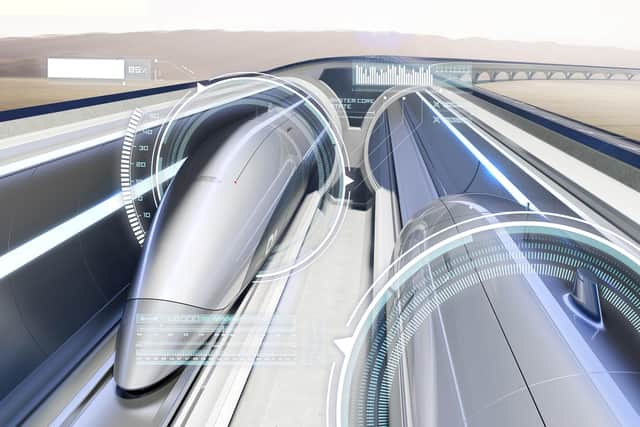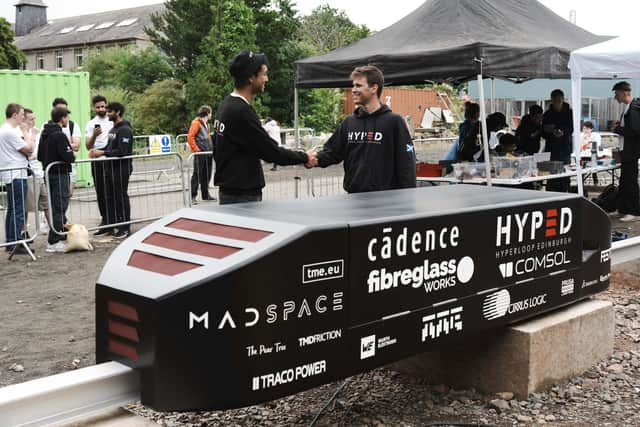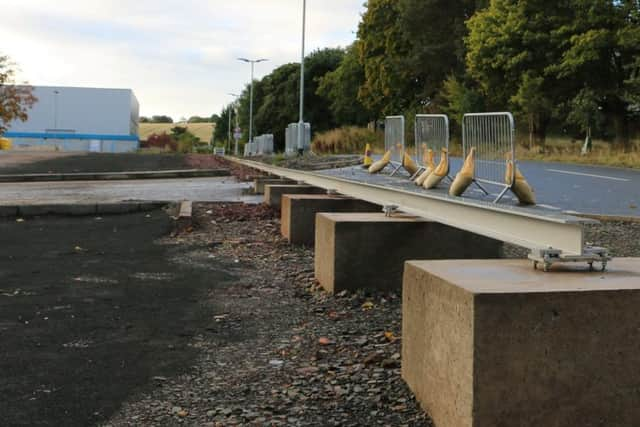Edinburgh University hyperloop group to test superfast pod – but 45-minute trips to London still 30 years away
One of the longest-running university groups helping to develop potentially-revolutionary 600mph ground travel has challenged claims the technology is dead as it prepares to trial a new prototype on a test track in Scotland.
Hyperloop would see passengers travel in electrically-powered pods along a frictionless vacuum tube, cutting Edinburgh-London journeys to 45 minutes – six times faster than by rail.
Advertisement
Hide AdAdvertisement
Hide AdReports last month suggested development of the concept had been halted by the collapse of one of the original and largest firms involved, Hyperloop One, which had been previously backed by Sir Richard Branson.
Univers ity of Edinburg h hyperloop group HYPED told The Scotsman that while the company’s closure had been expected, its own plans were firing ahead unaffected. However, some academics remain to be convinced about the technology.
HYPED president Juraj Pavlovic said: "I strongly disagree that the end of Hyperloop One is the end of hyperloop. I've read headlines all over the internet that hyperloop is dead for real this time, but I couldn't disagree more.
"I was not surprised about the demise of Hyperloop One. It was the first hyperloop companies and while it did quite well at first, there were multiple leadership changes, then Virgin pulled out its funds - there were signs this company wasn't going anywhere."
Mr Pavlovic admitted hyperloop had suffered from being overhyped, raising expectations that it would be developed within a few years, when he predicted it remained decades away.


He said: "This is a technology which is still in its very early stages and we'll need to wait at least another 30 years before we see it being implemented.”
However, he said it was significant that Elon Musk, who first championed the concept more than ten years ago, had not backtracked on it despite Hyperloop One folding.
Mr Pavlovic said: "Musk is not very vocal about it, but he has not said he regrets his decision to publish the Hyperloop Alpha white paper in 2013, or that the technology may not be feasible."
Advertisement
Hide AdAdvertisement
Hide AdHe said hyperloop would meet the demand for non-polluting high-speed travel as short-haul flights were increasingly phased out because of environmental concerns.


"It is becoming clearer that flights are big polluters, but the demand for travel is still rising. High-speed trains don’t go as as fast as planes, so a solution to that would be hyperloop because its speed is going to reach 500-1,000kmh (310-620mph) – which you would expect on a short-haul flight, but with a greener energy source.
"It will replace short-haul flights and connect cities both within countries and continents, but transcontinental travel in a hyperloop will be unlikely because building a network over such long distances will be too expensive.”
The pods would carry around 30 people each, operating at high frequencies such as every few minutes.


But Mr Pavlovic admitted passengers would have to be won over to the concept because of the acceleration involved. He said: "People are not convinced yet, purely because we haven't yet seen what hyperloop can be.
"We are already travelling as fast in aeroplanes, but the pods will accelerate faster. Further research will have to be done on the human body and what acceleration an average traveller would be happy to be subjected to.
"Rapid acceleration can be made comfortable - aeroplanes reach their speeds quite fast."
Making travel in a windowless compartment would also have to be made palatable. Mr Pavlovic said: "There would be no view, but the way to mitigate that would be to have some kind of screens displaying the scenery which passengers would be seeing outside if there was a window there.
Advertisement
Hide AdAdvertisement
Hide Ad"Some pods may have more space so people would feel less claustrophobic.”
The HYPED president predicted that hyperloop would catch the popular imagination once it was demonstrated on a larger scale, since the longest test track built to date is only 500m.
He said: "Once a 2km test track is built and people can see what kind of speeds can be reached, then more investors will come in, it will get more attention and progress will start accelerating. Hopefully more and more people will start to realise that this is a technology that would work.”
A university group from Munich holds the record of 288mph, set in 2019.
Mr Pavlovic said other companies working on the technology included Hardt Hyperloop in the Netherlands, which is building a test site for switching pods between tracks, while Zeleros Hyperloop in Spain is designing a system for rapidly moving shipping containers within a port.
Swisspod Technologies, which demonstrated last year that a hyperloop could turn, said it planned to carry a pod of around ten passengers in a low-speed test within five years at a site it was building in Colorado.
Chief executive Denis Tudor: “It is pretty sad about the largest player in the hyperloop market, but I am extremely confident in our technology and team.
"We propose an affordable hyperloop solution that would minimise the price of the infrastructure by not having any electrification on the rail and by building self-contained pods. We have just tested this solution in Switzerland – the first hyperloop test over medium distances.”
Advertisement
Hide AdAdvertisement
Hide AdBut he added: "I think hyperloop still requires more research and development to get to the promised speeds of 1,000-1,200kmh (620-745mph).”
HYPED’s sixth and latest prototype passenger-less pod since being formed nine years ago is due to be demonstrated on its 100m test track at the University of Edinburgh’s King’s Buildings science and engineering campus around June, although the expected speed of the 2.5m long and 1.5m wide pod remain under wraps.
Mr Pavlovic said: “It will definitely be a milestone, demonstrating we can travel at high speed.” A previous test on the track, built in 2022, was over only a 3m section because of battery problems.
However, some academics remain lukewarm if not hostile to the concept. Responding The Scotsman’s request for comment via the Science Media Centre, Professor Roderick Smith, of the Future Rail Research Centre at Imperial College London, said: “Hyperloop would be better called Hyperloopy.
“It is a froth of little understanding of costs, safety and engineering possibilities. It should come as no surprise that Hyperloop One has folded and many similar companies will follow.
"It can be confidently predicted no significant projects will ever come to passenger-carrying fruition.”
Dr Sharon George, a researcher in the Institute for Sustainable Futures at Keele University, said: “The technology is expensive and would take a long time to develop. There are transport systems that could benefit from investment to work better and cleaner, such as converting trains and heavy goods vehicles to run on hydrogen.”
Dr Eldad Avital, aerospace programme director at Queen Mary University of London, said: “Hyperloop technology is very challenging and requires significant resources.
Advertisement
Hide AdAdvertisement
Hide Ad"This high risk of development, sadly, may not make Hyperloop One's struggle to secure funding entirely surprising. Nevertheless, other smaller startups continue working in this area.
"As with any breakthrough technological development, this challenge certainly brings wider technological benefits in terms of high-speed aerodynamics and studying the effects of high-speed transport on the human body.
"Hence, I am certain universities worldwide, including Queen Mary, will continue to encourage and support students, including our own London Hyperlink team, to enthusiastically engage in related educational and research activities."
Comments
Want to join the conversation? Please or to comment on this article.